仁爱版英语七年级下册知识点归纳
仁爱版七年级(下册)知识点要点总结

仁爱版七年级(下册)知识点要点总结本学期研究的知识点包括:
语文
- 形音义的关系
- 修辞手法的运用
- 古诗文的鉴赏
- 现代文阅读与写作
数学
- 相反数与绝对值
- 分数加减乘除
- 二次根式与平方根
- 整式的加减乘除
英语
- 现在进行时
- 祈使句
- 简单过去式
- 数词与日期
历史
- 秦汉和尚书制的改革- 西汉时期的政治和军事- 东汉时期的政治和文化- 三国时期的政治和文化
生物
- 细胞的基本结构和功能- 生物多样性的认识
- 植物的结构和生长
- 动物的体内环境和调节
地理
- 中国的地理位置和自然地理条件
- 中国的人口与经济
- 中国的交通和旅游
- 国际热点问题的认知
政治
- 报告的主要内容
- 中国特色社会主义的本质特征
- 社会主义核心价值观的内涵与精神实质
- 当前的国际形势和中国与世界的关系
以上是本学期主要的知识点汇总。
在学习各科知识的同时,要
注意拓展视野、强化思维训练,努力提高语言表达能力、计算能力、探究能力和综合应用能力。
(完整版)仁爱版七年级英语下册知识点总结
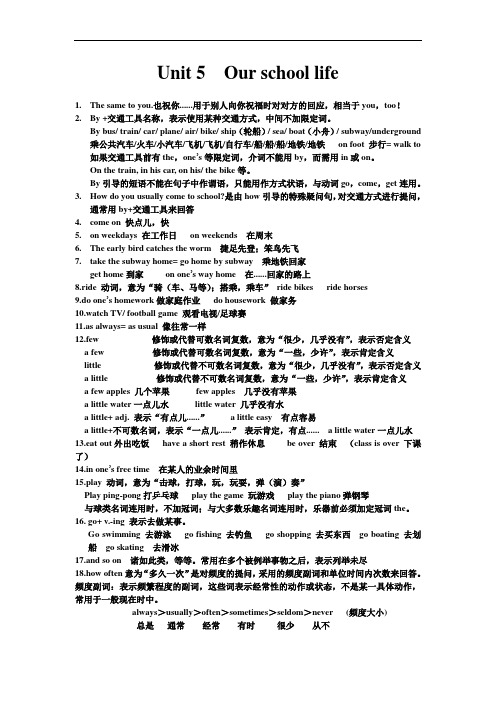
Unit 5 Our school life1.The same to you.也祝你......用于别人向你祝福时对对方的回应,相当于you,too!2.By +交通工具名称,表示使用某种交通方式,中间不加限定词。
By bus/ train/ car/ plane/ air/ bike/ ship(轮船)/ sea/ boat(小舟)/ subway/underground 乘公共汽车/火车/小汽车/飞机/飞机/自行车/船/船/船/地铁/地铁on foot 步行= walk to 如果交通工具前有the,one’s等限定词,介词不能用by,而需用in或on。
On the train, in his car, on his/ the bike等。
By引导的短语不能在句子中作谓语,只能用作方式状语,与动词go,come,get连用。
3.How do you usually come to school?是由how引导的特殊疑问句,对交通方式进行提问,通常用by+交通工具来回答e on 快点儿,快5.on weekdays 在工作日on weekends 在周末6.The early bird catches the worm 捷足先登;笨鸟先飞7.take the subway home= go home by subway 乘地铁回家get home到家on one’s way home 在......回家的路上8.ride 动词,意为“骑(车、马等);搭乘,乘车”ride bikes ride horses9.do one’s homework做家庭作业do housework 做家务10.watch TV/ football game 观看电视/足球赛11.as always= as usual 像往常一样12.few 修饰或代替可数名词复数,意为“很少,几乎没有”,表示否定含义a few 修饰或代替可数名词复数,意为“一些,少许”,表示肯定含义little 修饰或代替不可数名词复数,意为“很少,几乎没有”,表示否定含义a little 修饰或代替不可数名词复数,意为“一些,少许”,表示肯定含义a few apples 几个苹果few apples 几乎没有苹果a little water一点儿水little water 几乎没有水a little+ adj. 表示“有点儿......” a little easy 有点容易a little+不可数名词,表示“一点儿......”表示肯定,有点...... a little water一点儿水13.eat out外出吃饭have a short rest 稍作休息be over 结束(class is over 下课了)14.in one’s free time 在某人的业余时间里15.play 动词,意为“击球,打球,玩,玩耍,弹(演)奏”Play ping-pong打乒乓球play the game 玩游戏play the piano弹钢琴与球类名词连用时,不加冠词;与大多数乐趣名词连用时,乐器前必须加定冠词the。
(仁爱版)英语七年级下册知识点归纳与总结
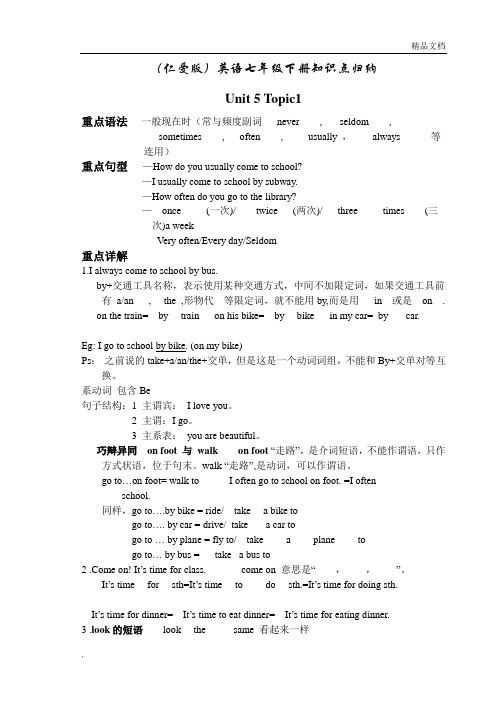
(仁爱版)英语七年级下册知识点归纳Unit 5 Topic1重点语法一般现在时(常与频度副词___never____, ___seldom____,___sometimes____,___often____, ___usually_,____always______等连用)重点句型—How do you usually come to school?—I usually come to school by subway.—How often do you go to the library?—__once_____(一次)/____twice___(两次)/___three ___times____(三次)a weekVery often/Every day/Seldom重点详解1.I always come to school by bus.by+交通工具名称,表示使用某种交通方式,中间不加限定词,如果交通工具前有_a/an___, __the_,形物代_ 等限定词,就不能用by,而是用___in__或是__on__.on the train=__by__ train on his bike=__by__ bike in my car=_by___ car.Eg: I go to school by bike. (on my bike)Ps:之前说的take+a/an/the+交单,但是这是一个动词词组,不能和By+交单对等互换。
系动词包含Be句子结构:1 主谓宾:I love you。
2 主谓:I go。
3 主系表:you are beautiful。
巧辩异同on foot 与walk on foot “走路”,是介词短语,不能作谓语,只作方式状语,位于句末。
walk “走路”,是动词,可以作谓语。
go to…on foot= walk to I often go to school on foot. =I often ________school.同样,go to….by bike = ride/__take__ a bike togo to…. by car = drive/_take___ a car togo to … by plane = fly to/__take__ __a__ __plane__ __to__go to… by bus =___take_ a bus to2 .Come on! It’s time for class. come on 意思是“____,____,____”。
仁爱版英语七年级下册unit6知识点
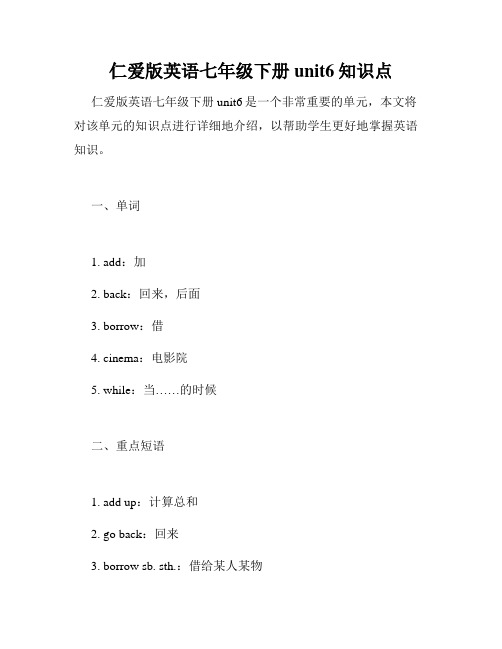
仁爱版英语七年级下册unit6知识点仁爱版英语七年级下册unit6是一个非常重要的单元,本文将对该单元的知识点进行详细地介绍,以帮助学生更好地掌握英语知识。
一、单词
1. add:加
2. back:回来,后面
3. borrow:借
4. cinema:电影院
5. while:当……的时候
二、重点短语
1. add up:计算总和
2. go back:回来
3. borrow sb. sth.:借给某人某物
4. go to the cinema:去电影院
5. while doing:在做……的时候
三、语法
1. There be句型
There be句型表示“有”、“存在”之意,例如:There is a book on the desk.即桌子上有一本书。
2. 句型I'm + doing sth.
这种结构常用来表达我们正在做某件事情,例如:I'm playing basketball. 即我正在打篮球。
四、例句
1. There is a cinema near our school.(我们学校附近有一家电影院。
)
2. I'm studying English while listening to music.(我边听音乐边学英语。
)
3. Can I borrow your pen for a moment?(我可以借用你的笔一下吗?)
总结
通过对仁爱版英语七年级下册unit6的学习,我们了解了很多单词、短语和语法结构。
好的掌握这些知识点,一定会对我们的英语学习帮助很大。
希望大家能够认真学习,并不断提高自己的英语能力。
仁爱英语七年级下册知识点归纳
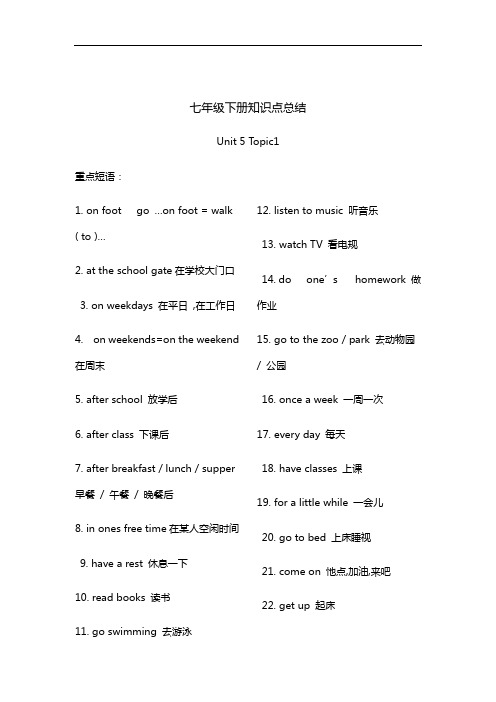
七年级下册知识点总结Unit 5 Topic1重点短语:1. on foot go …on foot = walk ( to )…2. at the school gate在学校大门口3. on weekdays 在平日,在工作日4. on weekends=on the weekend 在周末5. after school 放学后6. after class 下课后7. after breakfast / lunch / supper 早餐/ 午餐/ 晚餐后8. in ones free time在某人空闲时间9. have a rest 休息一下10. read books 读书11. go swimming 去游泳12. listen to music 听音乐13. watch TV 看电规14. do one’s homework 做作业15. go to the zoo / park 去动物园/ 公园16. once a week 一周一次17. every day 每天18. have classes 上课19. for a little while 一会儿20. go to bed 上床睡视21. come on 忚点,加油,来吧22. get up 起床23. talk with / to sb.不某人谈话26. and so on ……等等24. at school 在学校、在上课25. go to school 去上学重点句型 1. Happy New Year! The same to you.2. Your new bike looks very nice. Thank you.3. How do you usually come to school? —I usually come to school by subway.4. How often do you go to the library?5. —Once/Twice/Three times a week/Very often/Every day/Sedom6. The early bird catches the work. (谚语) 笨鸟先飞7. Work / Study must come first. 工作/ 学习必须放在第一位8. Classes begin at eight. =Class begins at eight.9. What time does the class begin? / What time do the classes begin?10. We have no more time. 我们没有更多的时间了。
仁爱版英语七年级下册unit7重难点知识归纳总结
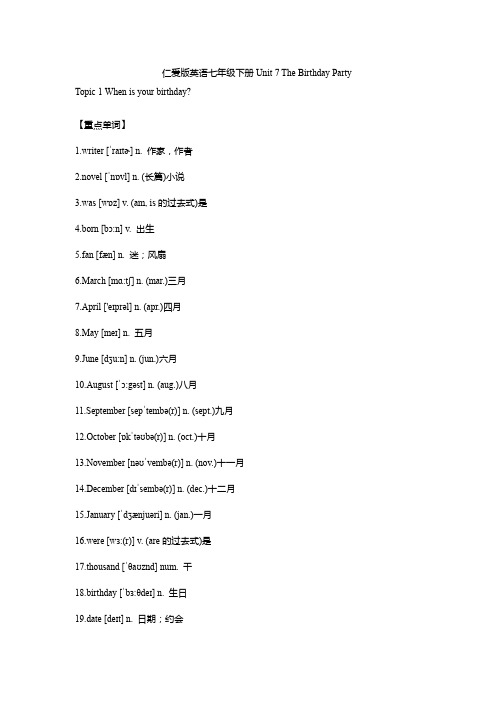
仁爱版英语七年级下册Unit 7 The Birthday Party Topic 1 When is your birthday?【重点单词】1.writer [ˈraɪtɚ] n. 作家,作者2.novel [ˈnɒvl] n. (长篇)小说3.was [wɒz] v. (am, is的过去式)是4.born [bɔ:n] v. 出生5.fan [fæn] n. 迷;风扇6.March [mɑ:tʃ] n. (mar.)三月7.April ['eɪprəl] n. (apr.)四月8.May [meɪ] n. 五月9.June [dʒu:n] n. (jun.)六月10.August [ˈɔ:gəst] n. (aug.)八月11.September [sepˈtembə(r)] n. (sept.)九月12.October [ɒkˈtəʊbə(r)] n. (oct.)十月13.November [nəʊˈvembə(r)] n. (nov.)十一月14.December [dɪˈsembə(r)] n. (dec.)十二月15.January [ˈdʒænjuəri] n. (jan.)一月16.were [wɜ:(r)] v. (are的过去式)是17.thousand [ˈθaʊznd] num. 千18.birthday [ˈbɜ:θdeɪ] n. 生日19.date [deɪt] n. 日期;约会20.calendar [ˈkælɪndə(r)] n. 日历21.plan [plæn] v. &n. 计划,打算22.celebrate ['selɪbreɪt] v. 庆祝23.party ['pɑ:tɪ] n. 聚会,宴会;党派24.fourth [fɔ:θ] num. 第四25.fifth [fɪfθ] num. 第五26.sixth [sɪksθ] num. 第六27.seventh ['sevnθ] num. 第七28.eighth [eɪtθ] num. 第八29.ninth [naɪnθ] num. 第九30.tenth [tenθ] num. 第十31.eleventh [ɪ'levnθ] num. 第十一32.twelfth [twelfθ] num. 第十二33.twentieth ['twentɪəθ] num. 第二十34.present ['preznt] n. 礼物35.shape [ʃeɪp] n. 形状v. 使成为……形状36.ball [bɔ:l] n. 球;舞会37.afraid [əˈfreɪd] adj. 担心;害怕38.star [stɑ:(r)] n. 星;明星39.mouse [maʊs] n. 老鼠40.square [skweə(r)] n. 正方形;广场;平方adj. 正方形的41.circle ['sɜ:kl] n. 圈,圆圈v. 圈出42.triangle ['traɪæŋɡl] n. 三角形43.rectangle [ˈrektæŋgl] n. 长方形;矩形44.oval ['əʊvl] n. 椭圆adj. 椭圆形的45.centimeter ['sentɪˌmi:tə] n. (cm)厘米46.Mrs. [ˈmɪsɪz] n. 太太,夫人47.cake [keɪk] n. 蛋糕【重点短语】1.be born 出生2.look at 看3.plan to do sth. 计划做某事4.have a birthday party 举办生日聚会5.the shape of ……的形状6.be like 像……7.how long 多长8.how wide 多宽e ... for ... 用……做……【重点句型】1.—When were you / was he/she born?你/他/她是什么时候出生的?—I/He/She was born on/in …我/他/她出生于……2.—Where were you / was he/she born?你/他/她在哪里出生的?—I/He/She was born in …我/他/她出生在……3.—When is your birthday?你的生日是什么时候?—May 13th.5月13号。
仁爱版七年级英语下册知识点总结

仁爱版七年级英语下册知识点总结仁爱版七年级英语下册知识点总结在日常过程学习中,说到知识点,大家是不是都习惯性的重视?知识点也可以通俗的理解为重要的内容。
哪些才是我们真正需要的知识点呢?以下是店铺为大家收集的仁爱版七年级英语下册知识点总结,仅供参考,大家一起来看看吧。
仁爱版七年级英语下册知识点总结 1㈠短语总结1. 在学校大门口 at the school gate2. 来学校 come to school3. 去学校 go to school4. 上课 have class / have classes5. 步行 on foot6. 骑自行车 ride a bike/ ride bikes/ by bike / on a bike7. 坐公交 by bus / take a bus8. 坐地铁 by subway / take the subway / on the subway9. 坐飞机 by plane/ take the plane / on the plane10. 坐小汽车 by car / in a car/ take a car/ drive a car11. 坐轮船 by ship12. 坐小船 by boat13. 坐火车 by train / on the train14. 在我们组 in our group15. 一群学生 a group of students16. 我们中的三个人 three of us17. 在平日 on weekdays18. 在周末 on the weekends / at weekends19. 起床 get up20. 睡觉 go to bed21. 早起 get up early22. 回家 go home23. 到家 get home24. 去动物园 go to the zoo25. 去公园 go to the park26. 看电影 see a movie / film27. 看电视 watch TV28. 在晚上 in the evening / at night29. 帮助父母 help parents30. 做某人的家庭作业do one’s ( my/ her/ his/ your/ their)homework31. 在学校 at school32. 知道,了解 know about / learn about33. 校园生活 school life34. 一个美国学生 an American student35. 在美国 in America / in the U.S.A.36. 许多学生many students/ a lot of students/ lots of students37. 很少 very few38. 吃午饭 have lunch39. 出去吃饭 eat out40. 在校期间 on school days41. 休息一会 have a short rest/ break42. 午饭后 after lunch43. 在某人的业余时间in one’s ( my/ his/ her/ their…)free/ spare time44. 打篮球 play basketball45. 踢足球play soccer / football46. 弹钢琴 play the piano47. 弹吉他play the guitar48. 拉二胡 play erhu49. 去游泳 go swimming / go for a swim50. 去划船 go boating51. 球赛 a ball game / ball games52. 一年四次 four times a year53. 听音乐 listen to music54. 读书 read books55. 看报 read newspapers56. 看医生 see a doctor57. 去图书馆 go to the library58. 一周两次 twice a week59. 见朋友 meet friends60. 每天 every day61. 在七点半 at half past seven62. 一小会 for a little while / for a short time63. 晚饭后 after supper64. 吃饭 have dinner65. 吃早饭 have breakfast㈡重要句型1. I usually come to school by subway.同义句: I usually take the subway to school.对划线部分提问: How do you usually come to school?类似的有:go to school by bike=go to schoolon a bike= ride a bike to school=ride to schoolgo home by bus=go home on a bus=take a bus home2. How do you us ually/ often…?你通常/经常怎样…?3. It’s time for class.=It’s time to have class. =It’s time for having class.4. What about you? =How about you?5. How often …? 询问频率,回答可以用频率副词:always,usually, often, sometimes, seldom, never, every day ,every +其他时间名词或表示频率的短语回答表示频率的短语:次数+单位时间e.g. : once a day / twice a week / three times a month6. The early bird catches the work. (谚语) 笨鸟先飞7. Work / Study must come first. 工作/ 学习必须放在第一位!8. Classes begin at eight. =Class begins at eight.提问: What time does the class begin? / What time do the classes begin?㈢重要单词的用法1. look (感官动词) 看起来,后面加形容词His mother looks very young.They look very cute.Her dress looks very nice.You look very cool in this coat.2. by 介词by 后面直接加表示交通工具的名词,中间不用任何词修饰,如:by bikeby +动词ing形式,表示通过某种方式People show love to their mothers by giving cards.You can be a good student by working hard.3. over (形容词)School / Class is over.4. begin现在分词: beginning 过去式: beganbegin to do sth , begin doing sthHe begins to write a letter. =He begins writing a letter.如果begin本身为分词,只能用begin to do sthHe is beginning to run.5. listen to 听(动作) , hear 听见(结果)6. always 反义词 never7. 本话题涉及的时态为一般现在时,句中常有频率副词或表示频率的短语,如果主语为三单,动词一定要用三单!仁爱版七年级英语下册知识点总结 21.短语归纳:Your name你的名字first name名字last name姓氏her name 她的名字telephone /phone number电话号码in China在中国2.必背典句:1.—nice to meet you!见到你很高兴!—Nice to meet you,too.见到你我也很高兴。
仁爱版七年级下册英语复习知识点
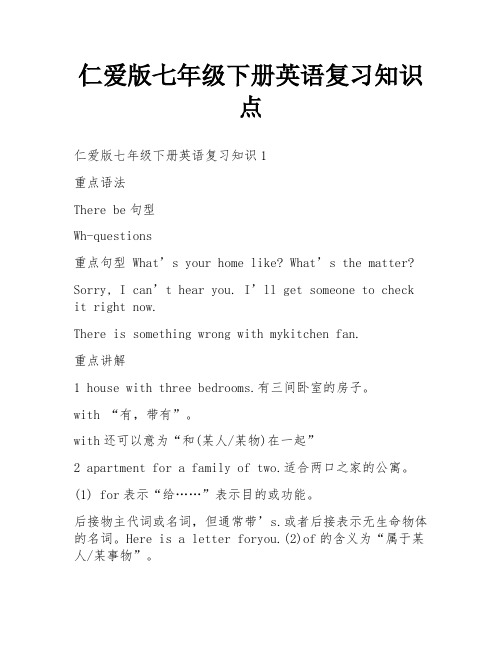
仁爱版七年级下册英语复习知识点仁爱版七年级下册英语复习知识1重点语法There be句型Wh-questions重点句型What’s your home like? What’s the matter?Sorry, I can’t hear you. I’ll get someone to check it right now.There is something wrong with mykitchen fan.重点讲解1 house with three bedrooms.有三间卧室的房子。
with “有,带有”。
with还可以意为“和(某人/某物)在一起”2 apartment for a family of two.适合两口之家的公寓。
(1) for表示“给……”表示目的或功能。
后接物主代词或名词,但通常带’s.或者后接表示无生命物体的名词。
Here is a letter foryou.(2)of的含义为“属于某人/某事物”。
She is a friend of Lily’s. = She is Lily’s friend.3 What’s the matter?怎么了?该句常用来询问某或某物出了什么什么问题或毛病;询问具体某人或某物出了什么问题时,还可以表达为:What’s the matter with sb./sth.某人或某物出了什么毛病。
What’s the matter? = What’swrong?4 Ihear you playing the piano.我听见你在弹钢琴。
hear…doing sth.“听见……在做某事”,强调正在进行的动作。
hear…dosth.“听见……做了某事”,强调全过程。
hearabout sth.听到关于某事物的消息 hear from sb.接到某人的来信、电话等hear of sb./sth.听到或知道某人或某事物的情况5 a lot of = lots of许多后接可数名词,相当于many;后接不可数名词,相当于much,用于肯定句中;但是注意:如果是否定句,则常用many或much.6 be far from… 离……远(抽象距离)be…away from…离……远(具体距离)My school is not far from thebookstore. The sea is 2 miles away fromthe hotel.7 There is something wrong with sb./sth.某人或某物出问题/有毛病了。
- 1、下载文档前请自行甄别文档内容的完整性,平台不提供额外的编辑、内容补充、找答案等附加服务。
- 2、"仅部分预览"的文档,不可在线预览部分如存在完整性等问题,可反馈申请退款(可完整预览的文档不适用该条件!)。
- 3、如文档侵犯您的权益,请联系客服反馈,我们会尽快为您处理(人工客服工作时间:9:00-18:30)。
仁爱版英语七年级下册知识点归纳Unit 5 Our School LifeTopic 1 how do you usually go to school ?1.???????? at the school gate在学校大门口2.???????? Happy New Year! 新年快乐3.???????? The same to you! 也同样祝你--- ---4. looks very nice! 看起来漂亮5.???????? come to school 来上学6.???????? come by bike= ride(s) abike 骑自行车7.???????? go by subway=take(s)the subway= in a subway乘地铁8.???????? go by bus=take (s) a bus/ in a bus / on a bus 乘公共汽车9.???????? by plane / by air /in aplane / on a plane 乘飞机10.???? by car /in a car / take a car坐小汽车11.???? by train / in a train / on atrain / take a train乘火车12.???? by ship/by boat / on aship/boat / take the ship 坐船13.???? go on foot=walk to步行14.???? walk to school走路上学15.???? watch TV看电视16.???? do one`s homework 做家庭作业17.???? see a movie 看电影18.???? Good evening 晚上好19.???? want to do sth 想要做某事20.???? what time 什么时间21.???? get up 起床22.???? on weekdays 周末23.???? at about six o`clock 在大约六点钟24.???? come on 快点25.???? It`s time for class 该上课了26.???? It`s time to have class该上课了27.???? know about 了解--- ---的情况28.???? school life 学校生活29.???? American students 美国学生30.???? take a yellow school bus乘一辆黄色的校车31.???? have/has lunch吃午餐32.???? at school 在学校,在上学33.???? eat out 外出吃饭,上馆子34.???? on school days 在校期间35.???? have a short rest 休息一会儿36.???? after lunch 午餐后37.???? after supper/after dinner 38.???? after class下课后39.???? after school 放学后40.???? listen to music听音乐41.???? read books看书42.???? go to the park去公园43.???? go to the zoo 去动物园44.???? go to the library去45.???? go to school 去上学46.???? go to work去上班47.???? school is over放学了48.???? class is over 下课了49.???? in one`s free/spare time在某人的业余时间里50.???? play basketball打篮球51.???? play soccer 踢足球52.???? go swimming去游泳53.???? go shopping 去买东西54.???? go fishing去钓鱼55.???? go skating 去滑旱冰56.???? go skiing去滑冰57.???? go climbing mountains去爬山58.???? go hiking去远足59.???? how often 多久一次60.???? ball games球赛61.???? have ball games 举行球赛62.???? four times a year 每年四次64.???? once a week 每周一次65.???? twice a week 每周两次66.???? three times a week每周三次67.???? Work must come first!工作(学习)必须放在第一68.???? twenty past six 六点过二十分69.???? at twenty past six 在六点二十分70.???? have / has breakfast吃早餐71.???? have / has lunch 吃午餐72.???? have / has supper 吃晚餐73.???? have / has dinner 吃晚餐74.???? half past seven 七点半75.???? a quarter past five 五点过十五分76.???? get home77.???? go / goes to bed 上床睡觉78.???? a quarter to ten 十点过十五分79.???? drive a car 开小汽车80.???? the Great Wall 长城Topic 2 He is playing soccer on the playground1.???????? Computer room 电脑室2.???????? dining hall 食堂3.???????? teachers` office 教师办公室4.???????? classroom building 教学楼5.???????? swimming pool 游泳池6.???????? in the library在图书馆7.???????? in the dormitory 在宿舍里8.???????? in the dining hall在食堂里9.???????? on the playground在操场上10.???? at the moment = now 此刻,现在11.???? clean the dormitory打扫宿舍12.???? clean the bedroom 打扫卧室13.???? clean the classroom打扫教室14.???? clean the blackboard擦黑板15.???? make cards 制作卡片16.???? Would you like to --- --- ?你想做--- --- 吗?17.???? Good idea! 好主意18.???? See you soon 一会儿见19.???? play computer games 玩电脑游戏20.???? May I borrow --- ---我可以借--- --- 吗?22.???? Ren’ai Project Englishworkbooks 仁爱英语练习册23.???? of course = sure =certainly 当然24.???? on time 准时25.???? in time 及时26.???? many students 许多学生27.???? do well in= be good at sth /doing sth 在--- ---做得好28.???? do better in 在--- --- 做得更好29.???? on the shelf 在书架上30.???? return = give back归还31.???? It’s a pleasure不用谢32.???? Thank you all the same还是要谢谢你33.???? lost and found 失物招领处34.???? looking for 寻35.???? some money 一些钱36.???? a picture of my family 一张全家福照片37.???? thank you all the same 还是要谢谢你38.???? school student card学生卡39.???? a pair of pants 一条裤子40.???? a pair of shoes 一双鞋41.???? two pairs of shoes两双鞋42.???? singing in the room 在房间里唱歌43.???? dancing in the gym 在体育馆跳舞44.???? swimming in the gym 在体育馆游泳45.???? show sb around 带领某人参观46.???? in the center of= in themiddle of在--- --- 的中间,在--- --- 的47.???? on the left 在左边48.???? on the right在右边49.???? next to 在--- --- 隔壁,在--- --- 旁边,紧挨看,靠近50.???? at the back of 在--- ---后部,在--- --- 后面51.???? near the playground 在操场的附近52.???? in the gym 在体育馆里,在健身房里53.???? in the swimming pool 在游泳池里54.???? talk about their families谈论他们的家庭55.???? Attention, please ! 请注意!56.???? between --- --- and --- ---在--- --- 和--- --- 之间57.???? stamp collection show集邮展58.???? school hall 学校大厅59.???? every Saturday每个星期六60.???? he is running 他在跑步61.???? in picture 1 在第一张照片里62.???? in picture 2 在第二张照片里63.???? look(looks) happy 看起来高兴64.???? love swimming 喜欢游泳65.???? talk to a Japanese girl和一个日本女孩交谈66.???? play the guitar 弹吉它67.???? in the classroom 在教室里68.???? in the office 在办公室里69.???? in the dormitory 在宿舍里70.???? on the playground 在操场Topic 3 our school is very interesting1.???????? What day 用来提问“星期几”2.???????? have a music class 上一节音乐课3.???????? at ten o`clock 十点钟4.???????? a quarter to eleven 十点四十五分5.???????? have a biology lesson上一节生物课6.???????? have a geography上一节地理课7.???????? have a . lesson 上一节体育课8.???????? have an art lesson上一节美术课9.???????? outdoor activities户外活动10.???? how many lessons多少节课11.???? every week 每周12.???? singing and dancing 唱歌跳舞13.???? drawing pictures 画画14.???? Working on math problems做数学题15.???? speaking English说英语16.???? learning about the past 了解过去17.???? an English book 一本英语书18.???? What do you think of it = Howdo you like it ? 你觉得它怎么样?19.???? Difficult and boring 难学而且乏味20.???? Which subject 哪一门课21.???? Easy and interesting容易又有趣22.???? Favorite subject ?最喜欢的科目23.???? My school life 我的学校生活24.???? At school 在学校里,在上学25.???? Be friendly to sb = be kindto sb对某人友好26.???? In the morning 在上午,在早晨27.???? In the afternoon在下午28.???? I aften speak English with myclassmates我经常和我的同学说英语29.???? After school 放学后30.???? Play basketball with myclassmates和同学们打篮球31.???? On the playground 在操场上32.???? Every Tuesday 每周二33.???? Every Thursday 每周四34.???? school newpaper 校报35.???? School Time 校36.???? And so on 等等37.???? Science Today 当代科学38.???? Thank sb for doing sth感谢某人做了某事39.???? best wishes 致以美好的祝愿40.???? read stories 看故事书41.???? have a biology class 上生物课42.???? have breakfast 吃早饭43.???? run on the playground 在操场上跑步44.???? have a physics class 上物理课45.???? watch animals 观赏动物46.???? play soccer at school 在学校踢足球47.???? read a book at home在家看书48.???? have dinner in the schooldinning hall 在学校食堂吃晚饭49.???? have dinner at home 在家吃晚饭Unit 6 Our Local AreaTopic 1 Is there a sofa in your study?1.???????? On the second floor在二楼2.???????? Why not =Why don`t you为什么不--- --- ?3.???????? Go upstairs上楼4.???????? Go downstairs下楼5.???????? Have a look看一看6.???????? A moment later 过了一会儿7.???????? Come in ,please请进8.???????? So many books 这么多的书9.???????? On the shelf在书架上10.???? You have a nice study 11.???? Dining room 餐厅12.???? Living room客厅13.???? On the first floor在一楼14.???? Cousins 表姐妹,表兄弟15.???? In the front of the house在房子前面16.???? In the kitchen在厨房17.???? In the study在书房18.???? In the dinning room在餐厅19.???? In the bedroom在卧室20.???? In the garden 在花园21.???? Behind the door 在22.???? Play with his pet dog和他的宠物狗玩耍23.???? Play games 玩游戏24.???? Clean the car清洗小汽车25.???? Read books 看书26.???? Have dinner吃饭27.???? Talk about 谈论28.???? Near my desk 在我桌子旁29.???? On your desk 在你桌子上30.???? So on 等等31.???? My family photo 我的全家福照片32.???? On the wall在墙上33.???? Put them away 请把它们收起来放好把它/它们收起来放好35.???? Look after = take care of照看,照顾36.???? In front the house 房子前面37.???? In the bottle瓶子里38.???? Near the window窗户边39.???? In the glass杯子里40.???? Model planes 飞机模型41.???? Under the bed 床下42.???? How many pairs多少双43.???? In the tree树上44.???? On the tree树上45.???? On the shelf书架上46.???? On the river47.???? A small garden一个小花园48.???? Many beautiful flowers许多美丽的花49.???? In the garden 花园里50.???? A big tree 一棵大树51.???? Under the tree在树下52.???? Very beautiful非常漂亮53.???? A large living room 一个在客厅54.???? A dining room 一个餐厅55.???? A kitchen 一个厨房56.???? A bathroom 一个卫生间57.???? I like watching TV in theliving room我喜欢在客厅里看电视58.???? I love playing on thecomputer in the study我喜欢在书房里玩电脑59.???? In the drawer 在抽屉里60.???? On the chair 在椅子上61.???? Under the chair 在椅子下62.???? In picture A图A里63.???? In picture B图B里64.???? On the walls在墙上65.???? In 在--- ---里面66.???? On 在--- --- 上面67.???? Behind 在--- ---下面68.???? Near 在--- --- 附近69.???? Next to 在--- --- 旁边70.???? In the front of 在------ 前面71.???? Don`t put it / them here别把它/它们放在这儿72.???? Write a letter 写一封信73.???? Describe different rooms inyour home 描述你家不同的房间74.???? The things around your home房子周围的事物75.???? I`m very glad to 我很高兴76.???? Get a letter from sb= hearfrom sb 收到某人的来信77.???? Tell sb about sth 告诉某人关于某事78.???? Tell sb to do sth 告诉某人做某事79.???? Tell sb sth 告诉某人某事Topic 2 What`s your home like?1.???????? What`s your home like?你家是什么样的?2.???????? An apartment building一座公寓3.???????? A town house 城镇住宅4.???????? Live with sb 和某从居住在一起5.???????? Your grandparents 你的爷爷和奶奶6.???????? A big farmhouse农舍7.???????? In the country在农村9.???????? Let`s help him 我们去帮助他吧10.???? In our group 在我们小组11.???? For rent出租12.???? Wanted 求租13.???? Small apartment for students小型学生公寓14.???? ¥850 a month 每月850元15.???? Call Ms. Guan 联系关女士16.???? House with three bedrooms一套三居室的房子17.???? House with furniture for afamily of three 适合三口之家,家具齐全的房子18.???? Looking for a quiet doubleroom 求租一间安静的双人间under ¥300 per month 月租低于300元19.???? Apartment for a family of two适合两口之家的公寓20.???? House with four bedrooms四居室21.???? Quiet double room 安静的双人间22.???? Excuse me打扰了,打扰一下,劳驾,请原谅23.???? Your new neighbor你的新邻居24.???? I`m looking for a store 我在找一家商店25.???? On the street corner 在街道拐角处26.???? Post office邮局27.???? Bookstore 书店28.???? Museum 博物馆29.???? Parking lot停车场30.???? Supermarket超市31.???? Hospital医院32.???? Bank 银行33.???? Train station火车站34.???? Park cars 停车35.???? Keep money 存钱36.???? Take trains乘火车37.???? See a doctor看医生38.???? Buy food 买食物39.???? Mail letters邮寄信40.???? Buy books 买书41.???? Keep and show things 保存和陈列物品42.???? Bookstored 书店43.???? Restaurant ['rest?r?nt]饭店44.???? I hear you playing the piano我听到你在弹钢琴45.???? The music is beautiful音乐很优美46.???? I`m afaid it`s too loud恐怕声音有点儿大47.???? I`m really sorry about that十分抱歉48.???? Mr. Smart 斯马特49.???? At the end of Elm Road 在榆树路的尽头50.???? On the right在右边51.???? A tall tree一棵大53.???? Mr. Lee 李先生54.???? Mr. Jones 琼斯先生55.???? Mr. Watson 华桑先生56.???? I live in Yushancun玉山村57.???? A quiet community 一个安静的社区58.????Many old people and famillieswith young children许多老人和有小孩的家庭59.???? Lot of = lots of 许多60.???? Tall buildings高楼61.???? Small gardens 小花园62.???? In an apartment building在一幢公寓里63.???? Close to 离--- --- 近,紧挨着的64.???? Near Xinhua Bookstore 在新华书店附近65.???? Far from 离------ 远66.???? Not far from 离------ 不远67.???? A community service center一个社区服务中心68.???? Call it for help 打电话向它求助69.???? How is the community?社区是什么样的?70.???? Living near your home 住在你家附近71.???? Do you like living there?你喜欢住那里吗?72.???? Green Community ServiceCenter绿色社区服务中心73.???? This is linda speaking.我是琳达74.???? Apartment 606,building SS幢606号房间75.???? What`s the matter? 有什么事吗?76.???? Kitchen fan 厨房排气扇77.???? There is something wrongwith = Something is wrong with 某人/某物出问题78.??? Get someone to check it派人去检查一下79.???? Right now 立刻,马上80.???? From--- to--- 从------ 到--- ---81.???? The traffic is heavy交通拥挤82.???? The cost of living is high生活费用高83.???? Houses with big yards 带大院子的房子84.???? A house with a garden 有花园的房子Topic 3 How can I get to the bookstore?1.???????? Go up this street to theend 沿着这条街一直走到尽头2.???????? On your left在你左边3.???????? How can I get to--- ?我怎样才能去--- --- ?4.???????? Go along Xinhuan Street沿着新华路走5.???????? Turn left at the firststreet 在第一条街口向左转6.???????? Go across the bridge穿过桥7.???????? It`s about one hundremeters along on the right 顺着右边走大约100米(就到)8.???????? Which is the way to--- ?哪一条是到--- --- 路?9.???????? The post office邮局10.???? I`m new here 我对这儿不熟11.???? On 在--- --- 上面12.???? On the corner of 在------ 拐角处13.???? Across from 在--- ---正对面14.???? Between --- and ---在--- --- 和--- ---之间15.???? Near the bridge 在桥的附近16.???? Yuanmingyuan 圆明园17.???? Tsinghua University 清华大学18.???? Peking University北京大学19.???? Haidian Bridge海淀桥20.???? Beisihuan Road 北四环路21.???? Ren`ai Education Institute仁爱教育研究所22.???? Bayi School 八一学校23.???? Haidian Road 海24.???? Haidian theater 海淀影剧院25.???? Dinghao Building 鼎好大厦26.???? Turn left and walk on向左拐并一直往前走27.???? You can`t miss it 你不会错过的28.???? Beitai Road 北台路29.???? Be --- away from离--- --- 远30.???? Need to do sth 需要做某事31.???? Take bus 乘坐718路车32.???? Change to the bus at AnzhenBridge 在安贞桥换乘108路车33.???? The way to Shuanxiu Garden去双秀花园的路34.???? At Liuli Bridge六里桥35.???? How far “多远”,问距离。
